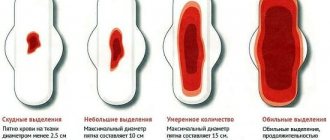The onset of menopause is a natural process associated with the decline of the reproductive functionality of the female body. Knowing this, not all representatives of the fair half of humanity, entering the threshold of menopausal changes, take seriously the discharge of bloody etiology that sometimes appears. And this is a wrong attitude towards your health. Particularly important manifestations of a bloody nature should cause caution in such situations when blood clots of a low-intensity nature appear during menopause, carrying a pathologically acute danger to women's health.
How does menopause occur?
The menstrual cycle ensures a woman's reproductive function. The process of egg maturation and shedding of the endometrium (the inner layer of the uterus) occurs monthly. Menopause, which is characterized by the extinction of this function, occurs gradually. The monthly cycle completes its existence in several stages :
- Premenopause. This period can last on average 2-5 years, depending on the functioning of the woman’s reproductive system. During premenopause, monthly bleeding occurs more profusely or, conversely, becomes scanty. The cycle also changes its duration shorter or longer. If a woman does not have concomitant pathologies, there is no need to treat these disorders. The main reason for heavy periods is hormonal changes in the body.
- Menopause lasts for 1 year in the absence of menstruation. At this time, a woman’s menstruation completely stops, and its resumption is considered a pathological phenomenon.
- Postmenopause. This period lasts for the rest of a woman's life one year after menstruation stops. The presence of any bleeding is a serious reason to consult a doctor for advice.
On average, menopause occurs in women after 45 years of age. Although this can happen later (up to 55 years old), and much earlier at 40 years old.
What to do if you're on your period
If a woman’s periods have not stopped after 50 years, this cannot be ignored. You should contact a gynecologist who knows what the patient was ill with during her life, how the pregnancy proceeded, what complications there were during childbirth, and so on. Don't panic in advance and suspect the worst. Menstruation after 50 years is not always a symptom of a dangerous disease.
It happens that menopause occurs later for physiological reasons, but it is better to be safe. In any case, the gynecologist will prescribe diagnostic procedures, based on the results of which he will draw conclusions about women’s well-being.
When there are diseases of the female genital organs, you need to try to be cured at the initial stage, and if it turns out that everything is normal, the doctor will simply give recommendations regarding nutrition, sexual activity and lifestyle in general. In a situation where reproductive function is preserved, it makes sense to take contraceptives, and here, too, one cannot do without consulting a gynecologist. Pregnancy in adulthood is very undesirable.
What kind of bleeding can occur during menopause?
Bleeding in women during menopause is divided into the following types:
- Organic. Menstruation can last for a long time in the presence of pathologies of the reproductive system or in the development of hormonal imbalance.
- Iatrogenic. Long periods are observed when the intrauterine device is installed incorrectly or when the rules for taking hormonal medications are not followed.
- Dysfunctional. They occur when there is a hormonal imbalance in a woman’s body, which leads to a change in the duration or nature of menstruation.
In turn, dysfunctional uterine bleeding is divided into the following types:
- Menorrhagia. Menstruation does not stop for more than a week, and the volume of blood released exceeds 80 ml.
- Metrorrhagia. Characterized by the appearance of bloody discharge in the middle of the cycle.
- Menometrorrhagia. It is characterized by long menstruation, which occurs very rarely.
- Polymenorrhea. In this case, the duration of the monthly cycle is reduced to 21 days.
What should a normal menstrual cycle be like during menopause?
Nature created that the female reproductive organs are activated once a month, renewing themselves and preparing for fertilization. A woman with normal menstruation during menopause should not feel pain or discomfort in her internal organs.
Three subtypes of long periods before menopause are identified.
1. Gradually stopping discharge is characterized by:
- lasting from two to three years;
- absence of unpleasant sensations;
- minor health problems.
2. Abruptly stopped periods have specific features:
- after long menstrual bleeding, menstruation stops;
- has a catastrophic effect on a woman’s health: dizziness , hot flashes, and nervous breakdowns appear.
3. An uncertain, inconsistent menstrual cycle entails:
- breaks between menstruation last 3.5-4 months;
- Women’s health is under threat – blood pressure levels , and the body feels generally unwell.
What indicates pathology
Long periods during menopause are not uncommon. During premenopause, a woman's cycle is unstable. Increased or decreased menstrual bleeding may periodically occur. It also often happens that periods disappear completely for several months, after which they return.
All symptoms that appear are explained by hormonal instability in a woman’s body. She does not ovulate so often, and the endometrium grows significantly, which has not happened before. In such conditions, it is not strange that menstruation becomes more abundant and does not appear on time.
But sometimes the change in the character of menstruation is abnormal. In this case, visiting a doctor is mandatory. The following signs indicate the presence of pathology in a woman’s body :
- Intense uterine bleeding, when it is necessary to change the pad every hour.
- The appearance of clots or other foreign inclusions in the monthly blood.
- The presence of bloody discharge after intimacy.
- The menstrual cycle lasts less than 20 days.
- Long periods - more than 8 days.
- Complaints of intense headaches and dizziness. Also, a woman should consult a doctor if she ever loses consciousness.
- Constant malaise, decreased performance, long-term depression.
- Pronounced pallor of the skin.
- Decreased blood pressure levels.
Reasons for monthly discharge
Without examining a woman, no doctor can identify the exact cause of long periods after 50 years. Without medical advice, we can only talk about the most likely factors, based on the amount, regularity, intensity and color of the discharge.
Common reasons why bleeding may begin:
- hormonal imbalance;
- a disorder of the pituitary gland, which affects the synthesis of a hormone that regulates the maturation of the egg;
- high blood pressure (increased blood flow causes heavy menstruation);
- varicose veins of the vagina.
With regular periods after 50 years, the reasons may be as follows:
- Hereditary predisposition, increased stress. In both cases, prolonged and heavy menstruation is observed.
- Ectopic pregnancy. This is a very dangerous pathology in which menstruation is accompanied by nausea, weakness, and dizziness.
- Incorrect selection or overdose of contraceptives. Also, prolonged bleeding may occur when changing one contraceptive drug to another.
- Pathological processes in the uterus. Some diseases are accompanied by the accumulation of bloody fluid in the organ cavity. When the discharge begins, the woman mistakes it for heavy menstruation.
- Infectious diseases of the genitourinary system. A common cause of menstrual irregularities is thrush.
Pathologies in which irregular discharge is observed:
- Malignant neoplasm in the uterus. Uterine cancer is a relatively rare disease, but it can develop at any age.
- Myoma. This type of tumor is characterized by changes in the monthly cycle, frequent dizziness, weakness and increased urination. At risk are women over 50 years of age. With timely treatment, the prognosis is favorable.
- Endometriosis. The disease is accompanied by pathological proliferation of endometrial tissue. Sometimes the process spreads to adjacent organs. Symptoms of endometriosis are severe pain in the lower abdomen and in the external genital area, heavy and prolonged periods. Most often, the pathology occurs at the age of 40-45, but fifty-year-old women are also susceptible to it.
How dangerous is postmenopausal bleeding?
If a woman has entered the postmenopausal period, the appearance of menstrual bleeding can only be associated with taking synthetic estrogens and progesterones. They make up for the deficiency of sex hormones, which provokes a semblance of menstruation.
In other cases, the woman should see a doctor for examination, since bleeding indicates a serious pathology. Most often these are symptoms of endometrial cancer. Polyps in the uterus, fibroids, ovarian tumors, and hyperplasia may also be detected.
How to quickly stop heavy and painful periods during menopause?
The menopausal period is characterized by the absence of bloody vaginal discharge, which previously appeared every month. The disappearance of menstruation indicates the end of the reproductive period in a woman’s life. But sometimes uterine blood can appear during menopause. How to quickly stop heavy periods during menopause without harm to health?
First aid for uterine bleeding
How to stop bleeding in women during menopause if it appears suddenly? At home, treatment involves the use of the following methods:
- Bleeding can be stopped if bed rest is strictly observed. You need to lie down with your feet on the pillow. If you do this, the flow of blood from the pelvis will improve and the bleeding will decrease slightly.
- You can stop the discharge with ice. Cold promotes better blood clotting, so it is applied to the lower abdomen for 2 hours. It is recommended to wrap ice in a cloth to prevent frostbite on the skin. Cold compresses are applied for 15 minutes, after which you should take a 5-minute break.
- Compliance with drinking regime. With intense bleeding, the human body loses a large amount of fluid. If the existing deficiency is not eliminated, the woman will feel unwell and even lose consciousness. In this case, it is recommended to drink warm tea, still water or rosehip decoction. During significant blood loss, it is recommended to consume sugar along with drinks. Glucose is necessary to nourish brain tissue.
- Taking medications. To prevent significant blood loss, it is recommended to take one of the medications - Vikasol, Aminocaproic acid, Dicinol. Your doctor will give you precise recommendations based on your developing symptoms.
How to stop heavy bleeding during menopause at home?
It must be said right away that this is not worth doing, since any intervention in the female menstrual cycle can result in gynecological diseases. The most optimal scenario is to immediately consult a doctor.
However, if you still decide to take the risk, the bleeding can be stopped using the following medications:
- Taking birth control pills or oral contraceptives can stop long and heavy periods for a long time. If you are already taking these medications, do not stop taking them.
- Vikasol. This drug can cause severe blood clotting, thereby stopping heavy periods.
- Tranexam. This remedy is also created in order to stop menstruation; you can purchase it in the form of tablets or injections.
- Duphaston. This hormone-based drug also helps stop bleeding. Its main advantage is that it does not affect blood clotting processes in any way.
Thus, long and heavy periods during menopause are a rather alarming sign that should not be ignored. It is better to visit a doctor and hear that everything is fine with you than to risk your own health. The fact is that most diseases of the female reproductive system, even with heavy bleeding from the vagina, can be cured completely, but only if they were noticed in the early stages.
Interesting and educational video on the topic:
Traditional treatment
If you have regular uterine bleeding, you can take special folk remedies that will significantly improve your well-being and quickly eliminate the problem. These include:
- Nettle decoction. The plant allows you to reduce the contractility of the uterus and narrow blood vessels . Nettle also activates the blood coagulation system, which eliminates heavy bleeding. To prepare the decoction, pour a glass of boiling water over a spoonful of plant material and keep it on low heat for about ten minutes. After cooling, the liquid is filtered. The medicine is taken 1 tablespoon, observing a 3-hour interval.
- Infusion of shepherd's bag. To prepare a healing remedy, you need to take a spoonful of herbs and pour 230 ml of boiling water over it. The mixture should be kept covered for an hour, after which it can be strained. The resulting infusion is taken one spoonful every four hours. It should be borne in mind that the drug is not recommended for use in thrombophlebitis.
- Kalina. The fruits of the plant help reduce the tone of the uterus, eliminate pain and strengthen the walls of blood vessels. As a result of taking viburnum, the intensity of menstruation is significantly reduced. It can be consumed as tea, fruit drink, or brewed as an infusion of inflorescences (1 spoon per 240 ml of boiling water).
- Decoction of orange peel. To prepare the healing remedy, you should peel six medium-sized citrus fruits. The resulting peel is placed in a saucepan with 1.5 liters of water. The mixture must be boiled until about 500 ml of liquid remains. The resulting drink is cooled and drunk 1.5 tablespoons three times a day.
- Decoction of clove leaves. About 200 g of plant material is used, which is poured with 260 ml of boiling water. The mixture should sit for about half an hour, after which it is filtered. I take the resulting medicine one spoonful every four hours. This remedy helps eliminate menstrual bleeding and significantly strengthen the walls of the uterus, which lose their elasticity with age.
If you use the presented traditional medicine recipes, you can significantly reduce the intensity of menstrual flow. But if the problem occurs frequently, a thorough examination is necessary to determine the exact causes of the pathology.











